| Srl | Item |
| 1 |
ID:
110193
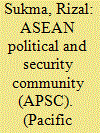

|
|
|
|
|
| Publication |
2012.
|
| Summary/Abstract |
Members of the Association of Southeast Asian Nations (ASEAN) took part in the World Summit 2005 and agreed to adopt the principle of Responsibility to Protect (R2P). However, there has not been any significant effort to discuss how the R2P might be applicable to the region and the issue remains a marginal one to ASEAN. However, the adoption of the ASEAN Political-Security Community (APSC) by ASEAN could provide a logical start for the maintraiming of R2P in ASEAN's discourse and practice. Some elements of the APSC appear to have characteristics in common with the R2P principle. While the APSC may provide broad and indirect support for building the capacity of States to recognise, prevent and respond to the situations of conflict, its immediate utility for preventing the four crimes of genocide, ethnic cleansing, war crimes and crimes against humanity nonetheless remains to be seen.
|
|
|
|
|
|
|
|
|
|
|
|
|
|
|
|
| 2 |
ID:
097775
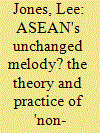

|
|
|
|
|
| Publication |
2010.
|
| Summary/Abstract |
The Association of Southeast Asian Nations (ASEAN) is widely supposed by theorists and commentators of many persuasions to have elevated the principle of absolute non-interference in the internal affairs of states into a central pillar of Southeast Asian regionalism. Non-interference is also criticised for retarding ASEAN from taking meaningful action over economic crises, problematic members like Myanmar, and transnational security threats. This article critiques this consensus, arguing that the norm has never been absolute, but has rather been upheld or ignored in line with the interests of the region's dominant social forces. While the principle formally remains in place despite such challenges and serious instances of violation, it is now subject to competing demands and contestation.
|
|
|
|
|
|
|
|
|
|
|
|
|
|
|
|
| 3 |
ID:
186173
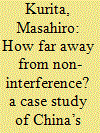

|
|
|
|
|
| Summary/Abstract |
China has been gradually shifting away from its traditional non-interference approach in development initiatives. This is particularly notable in the implementation of the China–Pakistan Economic Corridor (CPEC), a mega-development scheme that China is advancing in Pakistan. In this case, China’s aid and investment entail extensive interference in Pakistan’s internal affairs, forcing Pakistan to alter policies, regulations, and institutional arrangements over its political and economic governance, along with directly engaging with non-governmental actors in the country. Such acts of interference are largely orientated toward centralizing the decision-making and execution process in Pakistan over the CPEC, thereby facilitating its implementation in a manner profitable for Chinese stakeholders. This approach can be regarded as China’s promotion of autocracy in a ‘pragmatic’ way.
|
|
|
|
|
|
|
|
|
|
|
|
|
|
|
|
| 4 |
ID:
141607
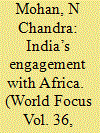

|
|
|
|
|
| Summary/Abstract |
The overarching objective of the three India-Africa Forum Summits since 2008 is to develop a new architecture for a structured engagement between India and Africa. They constitute a vital platform to engage with Africa at regional, sub-regional and bilateral levels. Our bilateral relations closely approximate the modern concept of development compact that is based on shared responsibility and helping one another meet their developmental goals. This compact is more South-South than North-South as it entails mutual gain, non-interference, collective growth opportunities and indeed an absence of loan conditionalities.
|
|
|
|
|
|
|
|
|
|
|
|
|
|
|
|
| 5 |
ID:
119622
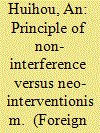

|
|
|
| 6 |
ID:
097125


|
|
|
|
|
| Publication |
2010.
|
| Summary/Abstract |
As we move further and further into the twentieth century, the Western 'global governance' norm of interventionism is being challenged by East Asian norm of non-interference and territorial integrity. The two sets of norms are historically and philosophically rooted and have influential backers. Intriguingly, while the two approaches appear irreconcilable, some countries have lent their support to both sets of norms. As East Asia emerges as a major force in global relations can a way be found for the two sets of contrasting norms to exist side-by-side, perhaps each governing particular regional relations, or is it even possible that a compromise set of 'global' norms might be developed?
|
|
|
|
|
|
|
|
|
|
|
|
|
|
|
|